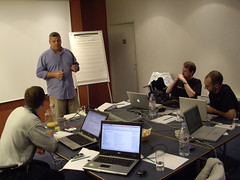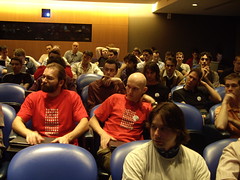Updates, part two.
- Crystal Space – In January 2007, Crystal Space finally, after 10 years (sic!) of development, has reached 1.0 release. One of the most popular and important projects related to open source gaming space has a stable release! It’s a big step forward, and I consider it as a symbol. Many of the things that happened after this release could of course happened before CS 1.0, but the magical barrier, that means “you can rely on this release” is important. CS is now in 1.2 stage, with many game projects using it, and it’s joining with Blender in effort to create a new game, more on this later. CS is healthy and stays important part of currently rising open source game world. Read changelog to get an idea on where CS is in terms of new features.
- Yake – this project spent the last 1,5 year in the shadow, but surprisingly it’s alive! They have skipped 0.5 release, and went straight forward to 0.6 released on April 2007 to public and 0.7 being ready in it’s branch. On the other hand, the wiki is down for some time, it’s hard to find any changelogs. Most of the communication happens through forums, and there’s not much going on yet. I’d say that probably Yake is waiting for it’s “1.0” to get momentum and attention. Pity, cause it seems to be the cleanest API for game writing and it bases on OGRE, so you get all the beauty of OGRE updates and Yake updates with each release.
- Speaking of OGRE 3D – In mid 2005, OGRE got it “1.0” and it took a year to get next stabel release – 1.2. It happened on May 2006, and was followed by 1.4 in March 2007. I’m not a game dev, just an observer, but OGRE seems to be the biggest project around. With professional games like Ankh or Pacific Storm it was tested in battle, huge wiki, strong and ultra-active community, and huge amount of projects using it, it’s just a pleasure watching it’s growth. It seems that this project is getting attention beside of the Open Source/Linux walls and may be one of the best ambassadors beside of Firefox, Open Office, Thunderbird or Blender that we have.
- Blender – another success story. Since last Project Watcher, Blender upgraded itself from 2.40 to 2.45. It’s simply impossible to list all the new features between those two. Just read the release notes: 2.41, 2.42, 2.43, 2.44, 2.45.
By the way. I love how they present themself to the community. Their release notes are the best I’ve ever seen (even a total newbie can *see* what’s going on), they have huge amount of community related websites, great video tutorials, and extremely interesting UI. It has rather high learning curve, but it’s very intuitive once you get it and feels very fast. - GIMP – This project reminds me Mozilla Suite it many ways. It has great potential, but UI blocks it from being a success. It took them a way too much time to release 2.4, but it’s very nice and mature. The only problem that stays is the UI, which is impractical and hard to learn. Fortunately they guys know what keeps them down. MMIWorks, a company specialized in UI design, is tracking the work on the new UI. What’s interesting here is that Gimp team tends to use the community and they keep their progress in open. Read the Wiki, and the blog. I may be wrong but it seems to be the first “big” open source project that goes through major UI redesign to match the world standards and it happens in open. It’s very interesting to watch how this works.
- Elephant’s Dream – The movie is ready now. You can download it and watch, it’s beautiful, but too “artistic” in screenplay for me. I’d like something “easier” to attract wider attention. They probably can read my mind, cause they already started project “Pitch” – another open source movie made in the model of “Hack’a’ton” (well, half year of it). It’s going to be cute, pink and funny. During each movie they testing quality of Blender and influencing it’s development. Oh, it’s perfect model of development 🙂 You’ve got open source movies, better 3d software, and models from the movie will be used in the open source game (Crystal Space + Blender). Tadam 🙂
Enough for today. The gaming/modeling stage is very healthy and all the projects are progressing (with Yake a bit behind) 🙂 I should add Irrlicht and Inkscape to the group, and I’ll write more about it once I get through the current state of whole Project Watcher list and start adding new members.

